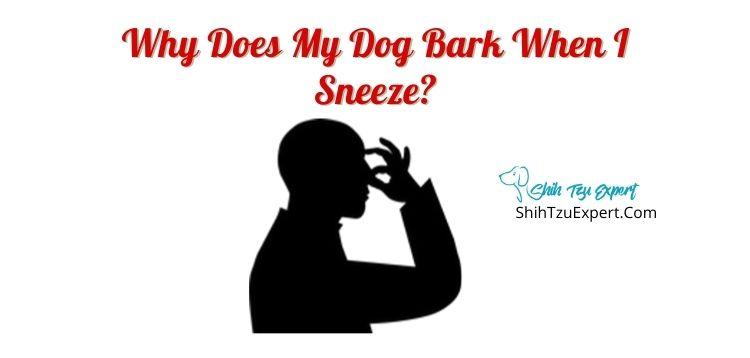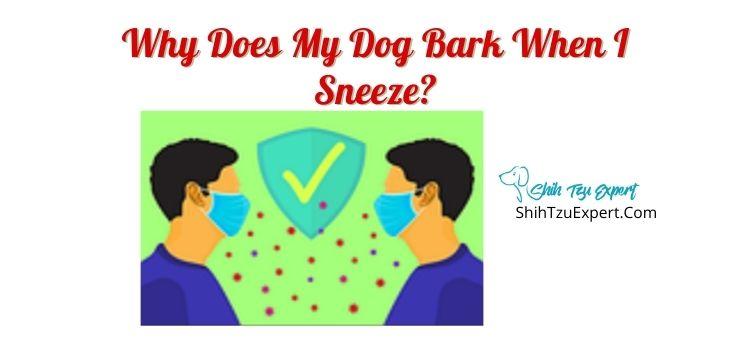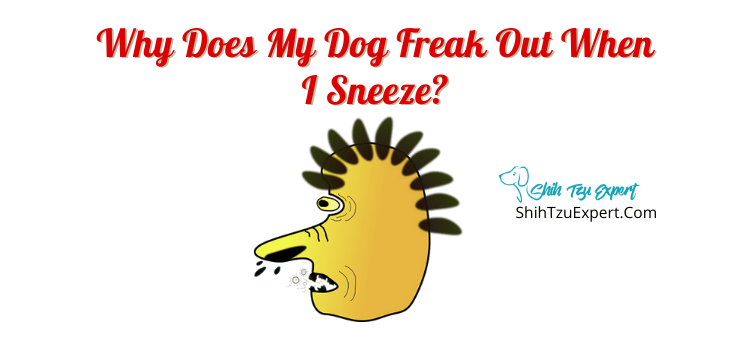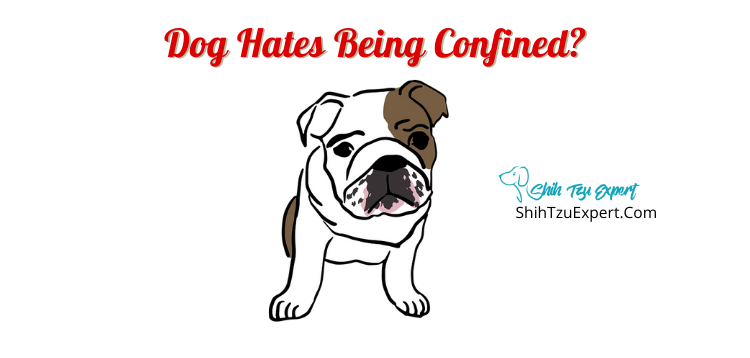Why Does My Dog Bark When I Sneeze?
Dogs frequently respond to our feelings because they are compassionate. These responses, though, don’t always make sense to us. Like sneezing. Our dogs can become terrified when we sneeze, racing to your side or running away in fright.

Does My Dog Have A Serious Mental Disorder?
Emory University researchers found in a 2013 study that dogs can experience anxiety, despair, and obsessive-compulsive disorder, or OCD, because the emotional parts of their brains are strikingly similar to ours. Since our dogs are unable to communicate their emotions to us, it is up to us to spot the warning signs.
Why Does My Dog Bark When I Sneeze?
So your dog barks whenever you sneeze, why? Common factors include the belief that you are in danger, the fear it causes your dog, and occasionally the stress it produces.
When looking into the cause of your dog’s behavior, there are several factors to take into account.
Dog Is Trying To Help You
Do you ever sneeze, and a few seconds later, your dog rushes over, barking and with a troubled expression on their face?
If so, your dog might interpret it as a pain-related cry.
When you do it, you could have a tendency to make a “squeaky” sound. And it sounds somewhat like when people yell for aid or when pets howl in pain.
As a result, they might even touch you or come close to your face because they want to make sure you’re okay and are concerned.
It’s A Surprise For The Dog
You could have surprised him.
As a result, they may rush up to you and startlingly bark if you disrupt their slumber. You might have disrupted their dream in which they were pursuing a squirrel.
Nevertheless, nobody can hold you liable for that. Because it usually just appears out of nowhere. Even people are surprised by it!
There are times when you can sense it coming and stop it, but other times, it simply happens and everyone is surprised.
It’s Too Loud For The Dog
Even if it’s an average one, it could be much louder for them. A typical human sneeze, according to scientists, can be as loud as 90 dB. which they likened to a lawnmower’s sound.
So it might have sounded like someone temporarily blasted extremely loud music in their ears. So they will undoubtedly freak out.
The Expelled Air Hit The Dog Forcefully

Do you ever sneeze unintentionally next to your dog?
Oh, so that’s why they immediately start to bark and yell at you.
Your lips and nose just forced out an explosive breath. Dogs may also detest it bitterly.
They don’t know why you did it, therefore it happens out of the blue, which is why. They might not enjoy it as well because it is too close for comfort.
The Expelled Mucus Hit The Dog Forcefully
Our body uses sneezing as a technique to clear our nose.
It occurs when our system recognizes potentially harmful pollen, dirt, or dust in our nostrils.
We were unaware, however, that a research found that one sneeze might release 100,000 contagious germs into the air.
This means that even if your dog couldn’t see it, it might still smell and feel bad.
In addition, you suddenly started exuding water. Your dog may suddenly take a shower, in which case they will bark at you and claim it’s gross.
You Have Encouraged The Behavior
It’s also possible that you’ve rewarded the behavior by providing the animal what it wants when it engages in it. When it barks when you sneeze, it may do it more frequently if you tend to reward it with toys, snacks, or more attention.
It would be more beneficial to ignore it until it stops barking, and then to treat it once it has been silent for some time.
The Sneeze Triggered Some Bad Memories For The Dog
It’s also possible that your dog is extremely frightened of it.
But do they have generalized phobias? Or does their nervousness only occur when someone sneezes?
If the latter, they may have gone through something terrible with it. Or it brings to memory a gruesome noise they heard as children.
If they are a rescue, this is conceivable because you never know how they lived their early years.
They may have been teased with it by certain persons. And if dogs are exposed to it frequently, especially if it is constantly loud, they may get more concerned about it.
Over Comforting Behavior
Dogs occasionally exhibit certain behaviors. They do so because they expect to benefit from it.
So it’s possible that when you sneeze, your dog is encouraged to bark.
Perhaps you’ve given them consolation each time they do it. They understood that they could receive additional love from you after that.
Noise Aversion Behavior
Your dog may get afraid as a result, which could also be the cause. This is more likely if the animal exhibits symptoms of fear, such as crying, hiding, and shrinking its body. Training with positive reinforcement would certainly be helpful in this situation as well.
They Get Stressed Out When You Sneeze
It’s possible that because sneezing in the past resulted in punishment, it now becomes agitated when it happens. This would be more likely if your dog started pacing or chewing on objects, which are indicators of stress in dogs.
They Are In Pain
Has your dog suddenly developed a sensitivity to noise?
Oh, no. They may be experiencing excruciating discomfort. They therefore bark to show their concern.
It can be an ear infection or joint ache. Additionally, when the body is frightened by a loud noise, it tenses up and yells and cries out for help.
Additionally, according to researchers, people might have connected those noises with pain. They are therefore reminded of the feeling every time they hear it.
Your Dog Thinks That You’re In Danger
It may be because it believes you are in danger. This would be more likely if it does it more frequently when you sneeze repeatedly, loudly than normal, or if something approaches you. Giving it training with positive reinforcement in this situation, as described below, would be beneficial.
Does My Dog Think That I Have A Serious Disease ?
It may be because it believes you are in danger. This would be more likely if it does it more frequently when you sneeze repeatedly, loudly than normal, or if something approaches you. Giving it training with positive reinforcement in this situation, as described below, would be beneficial
Is It Common For Dogs To Bark When You Sneeze?
They don’t comprehend what you are doing, is the general response. Sneezing appears out of nowhere, and while other people may recognize what a person sneezes like, dogs cannot.
They witness their owner make an odd face and an abrupt loud noise. They will look into the source to see if anything is amiss because they are sympathetic beings, just like they would check on a pack leader in the wild.
How To Get My Dog To Stop Barking I Sneeze?
Never Punish It For Barking When You Sneeze
When you sneeze, you might be tempted to yell at your dog to stop barking. This is not advised, though, as it is a source of attention and might even make it bark more. It would be preferable to ignore it and then give it a treat once it stops barking.
Never Comfort It When The Dog Is Distress Because You Sneezed!
You might refrain from petting them if they have a fear of noise or hold back on displaying a lot of emotion.
I do understand it’s difficult to resist giving them a hug and assuring them that everything will be fine.But those comforts might only make them more anxious. Since they are unable to think clearly under stress.
Additionally, your dog will believe that you approve of the behavior if you console them. which will encourage them to repeat the action.
Therefore, you can just let them settle down on their own, like a resilient furry child. And the following advice might be useful in this regard.
Use Positive Reward Based Training
Through rewarding your dog when it displays the desired behavior, you can learn it to act that way. This method is known as positive reinforcement training.
You could try the following to stop it from barking when you sneeze using positive reinforcement training:
Play soft sneeze noises or simulate moderate sneezing yourself, and give it treats if it doesn’t bark.
Gradually turn up the loudness or pretend to sneeze louder, and when the dog doesn’t bark, praise it.
If it starts to bark, turn down the volume and then turn it back up.
Stop Encouraging The Behavior
Dogs normally do not sneeze very often or for the same reasons as people, who tend to do so because of allergies or colds.
Obviously, you have no control over how quickly your body reacts, but you do have control over how loud you sneeze. When you are with your furry friend, be careful to sneeze as quietly as you can, and keep your post-sneeze behavior calm to reassure your pet that everything is well.
You can attempt counter-conditioning him to the sound if he reacts to your sneeze by giving him a treat every time he hears a sneeze. He will eventually understand that sneezes equal goodies and won’t perceive your perplexing behavior as a threat any longer.
Additionally, be sure to behave “normally” around your dog going forward to avoid confusing him further. Do not allow them to believe that it is playtime, even if they could mistakenly interpret the sneeze as an invitation to play. Resume your work while assuring them that everything is fine.
Distract The Dog To Divert Its Attention, Just Before You Sneeze (Easier Said Than Done!)
Your dog is entirely focused on you when you sneeze. And to express their attention, they’ll bark.
What if you try to divert that energy in a different direction?
After you sneeze, you can play a game for them or present a recording of the sound you just made.
Say, “It’s fine”. Grab their favorite toy, say “Relax,” and then throw it.
Your dog will eagerly discover it and focus their attention on that.
Help The Dog Conquer Its Fear Of Sneezes
Encourage your furry friend to overcome its anxiety for your protection.
Just carry out these simple measures.
- Look for a sneezing sound video. Alternatively, you could “fake sneeze” and record it.
- At a low volume, play it to them. To prevent your dog from becoming spooked, keep it far enough away.
- Then give him delectable snacks while it is playing.
- Increase the sound a little if they’re quiet and collected.
- After that, move it about the area until it is near your location.
- Put it in the previous volume if they started to bark or appeared tense.
- You may intensify it as you go along and even link it to when they are eating. Therefore, they will have a positive experience.
Depending on your dog, this could take a couple of days or a few weeks. Therefore, a lot of time and patience may be required. But if you put up persistent work, you will undoubtedly help your dog conquer its fear.
Get A Dog Trainer’s Advice
If you feel your dog’s phobia is harming their quality of life, you might need to visit your neighborhood veterinarian or ask a dog training specialist right away.
They might instead be in discomfort as a result of old age or an ear infection could be making them more sensitive.
Thus, doing so will inform you about the meds and appropriate care they require. Their degree of comfort should be a priority, in addition to their health.
Why Does My Dog Come To Me When I Sneeze (Or Cough)?
Dogs live in packs with a pack leader in the wild. The pack’s whole membership regularly checks in with the pack leader and each other. The other dogs attempt to reassure the leader if they are harmed.
Because you are their pack leader, your dog will rush over when you sneeze. They want to make sure you’re okay and to make sure nothing unfavorable is taking place.
Why Does My Dog Lick Me When I Sneeze?
When you sneeze, dogs will come over and kiss you in an effort to make you feel better. They assume you are in agony or suffering since they do not realize the noise you produced was unintentional.
Even though you might welcome the extra attention, if the licking disturbs you, you can teach your dog not to be scared by rewarding them after you sneeze to demonstrate that there is nothing to be concerned about.
Why Does My Dog Run Away When I Sneeze?
Dogs and humans both exhibit basic fight-or-flight reactions.
Your dog may scurry away when you sneeze just out of terror of the abrupt, loud noise you produced. Offer your dog a treat or toy after you sneeze to help them learn to associate the sound with something enjoyable rather than terrifying if you wish to stop this habit.
Why Does My Dog Sneeze When It Barks?
Although occasional canine sneezing can be considered normal, if the sneeze starts to occur frequently or is accompanied by other symptoms, this may indicate an underlying medical concern.
Dog sneezing is typically brought on by an allergen, an infection, or something that irritates the nasal passages. You might not need to take any action if your dog just sneezes on occasion. Contacting your veterinarian is a must if your dog is frequently sneezing or exhibiting other symptoms.
Why Does My Dog Sneeze Instead Of Barking?
Dogs will occasionally “fake sneeze” to attract attention or show that they want to play.
It’s possible that your dog is pretending to sneeze when they sneeze around mealtimes or during routine walks.
Dogs who pretend to sneeze frequently look at you while doing so to catch your attention. To make sure you pay attention, they might even approach you and sneeze on or next to you.
Why Does My Dog Sneeze Before Barking
Your dog may occasionally snort before barking, which you might have mistook for sneezing. Sneezing differs significantly from snorting though. Snorting is a sign that your dog may have an obstruction in the upper airway in the mouth.
Additionally, if your dog is overweight, they will have trouble breathing and snort as a result. Because of the aforementioned causes, your dog may occasionally snort before barking, leading you to believe they are sneezing.
Why Does My Dog Sneeze After Barking
Dogs who reverse sneeze experience paroxysmal respiratory symptoms (shortness of breath) as a result of nasal infections and irritants. Dogs who perform reverse sneezing make snorting and gagging noises after continuously opening and closing their jaws to breath air.
So, before and after barking, this condition is extremely prevalent in dogs. If your dog is suffering from reverse sneezing, you should take them to the clinic.
Why Do Dogs Sound Like They Are Sneezing
When a dog’s soft palate is upset, reverse sneezing, often known as a “backward sneeze,” might happen. The muscular portion of a dog’s back roof of the mouth known as the soft palate aids in breathing, swallowing, and vocalization.
The trachea narrows as a result of the irritation spasming that soft palate muscle. The dog will stretch its neck in an effort to expand its chest while breathing, but because of the restricted trachea, they are unable to take in a complete breath of air.
The dog will then make an effort to breathe via their nose, which will compel them to sneeze backward.
https://wagwalking.com/behavior/why-dogs-dont-like-it-when-you-sneeze
https://www.petmd.com/dog/general-health/reverse-sneezing-dogs-it-normal




